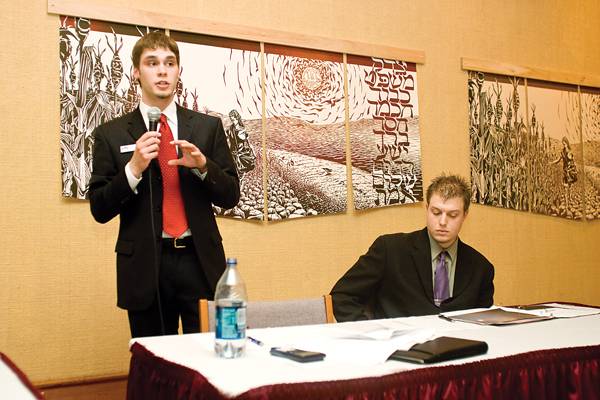GSB debate touches on Campustown, debt

GSB presidential candidate Jason Boggess, senior in mechanical engineering, speaks at the assembly at the Gallery of the Memorial Union on Tuesday, February with his vice presidential candidate Derek Haskin, junior in pre-business. Photo: Gene Pavelko/Iowa State Daily
February 17, 2009
Campustown improvements and college affordability were hot topics at the Government of the Student Body presidential debates Tuesday at the Memorial Union.
GSB Speaker of the Senate Jonathan Turk, junior in political science, and his running mate, Campustown Senator Chandra Peterson, junior in political science, said their combined experience in student government makes them qualified to serve as president and vice president of GSB.
“We’re already out there, we’ve already been writing bills,” Peterson said. “We have the experience that the students need.”
Jason Boggess, Martin Hall president and senior in mechanical engineering, is also running for GSB president with his running mate, Derek Haskin, Helser Hall president and junior in pre-business. Haskin said since he and Boggess have played active roles in the Inter-Residence Hall Association, they have a good understanding of the every day lives of students.
“We have four people here who are very experienced. Two are experienced with more of a community aspect in the residence halls, and two over here that are experienced with being on Government of the Student Body and kind of doing paperwork,” Haskin said.
Boggess said some major parts of their platform include instigating a university-run recycling system and a focus on student debt. He said it is a problem that athletes are offered more scholarships than other students, and that the discrepancy should be balanced.
Turk and Peterson also promised to do what they can to make college more affordable for students and also said they would improve Campustown. They said they will work to improve communications between the GSB and the student body and fight for more voices in city government.
Turk also said that if elected, he and Peterson would look into improving the university’s dead week policy.
“We’ve all had those fun times where it was dead week and we had a quiz or a paper due,” Turk said. “We want to review that to see if it could actually be enforced.”
Turk said many past GSB administrations have made guarantees to improve Campustown in the past with few results, but he assured that he and Peterson will actually deliver on their promises.
Peterson said she is currently serving as a Campustown senator for GSB, and she has looked into ways to bring about the needed changes, including the state-run Urban Neighborhood Development Program, which would send people to assess the needs of the community.
“The state brings in people and they tell you what you need to make Campustown better. They say, ‘You need an Italian restaurant.’ They come in and they do the work for you,” Peterson said.
Boggess said he and Haskin oppose working to improve Campustown at the moment, and that some of the suggestions for improvement he has heard, including an idea to add flowers and statues, are “ridiculous.”
“We all know that we’re in the middle of a recession here. Why would we want to waste university GSB money, your tuition money, putting flowers in Campustown? From our perspective it’s a waste of student money,” Boggess said.
Turk said their plan would not be using student tuition money to implement the improvements, they are instead looking to the city and proposing grants for the funds.
“We want to use GSB resources in terms of manpower in helping us apply for those things. No, we don’t want to use your student activity fees for that, that’s absurd,” Turk said.
There were about 50 people who attended Monday’s debate, including Nathan Dobbels, sophomore in agricultural and life sciences education, who said he has not yet decided on who he will support because, as a member of GSB and IRHA, he has connections to both tickets.
After the debate, Dobbels said he was still unsure because both campaigns had some good points and comments.
“I’m going to be here for the next debate, that will hopefully finalize my decision for who I will support. But as of right now, it was a pretty neutral debate, both sides had a lot of good thoughts,” Dobbels said.






